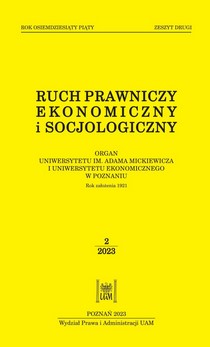DISQUALIFICATION OF AN EMPLOYEE OF A PUBLIC ADMINISTRATION AUTHORITY IN THE EUROPEAN UNION MEMBER STATES
DISQUALIFICATION OF AN EMPLOYEE OF A PUBLIC ADMINISTRATION AUTHORITY IN THE EUROPEAN UNION MEMBER STATES
Author(s): Zbigniew R. KmiecikSubject(s): Public Administration, EU-Approach / EU-Accession / EU-Development, EU-Legislation, Administrative Law
Published by: Uniwersytet im. Adama Mickiewicza w Poznaniu
Keywords: administrative proceedings; impartiality; bias; close persons; consanguinity; affinity;
Summary/Abstract: One of the rules contained in the Code of Good Administrative Behavior adopted in 2001 by the European Parliament is the principle of impartiality and independence (Article 8). The presence of this rule, despite its non-binding nature, prompted the author to examine – using the method of comparative law analysis – whether the EU Member States have regulated this issue in their legal systems – and if so, to what extent and how. The basic institution serving the implementation of this principle is the disqualification of an employee of the authority from participation in the proceedings in situations where their impartiality seems to be at risk. Not all EU countries explicitly provide for such an institution. Among the legal systems that contain it, only some regulate the entirety of issues related to it: the grounds for disqualification, the procedure for disqualification and the consequences of it, as well as the appealability of orders taken in this matter and the consequences of violating the provisions on disqualification. Regulations of individual issues differ in the degree of detail. This applies primarily to the reasons for the disqualification of an employee of the authority. The most important reason for the disqualification of employees (except when they or their spouse are a party to the proceedings) is the consanguinity or affinity between them and the party. However, the ranges of such ties resulting in automatic disqualification of an employee, adopted in EU member states, differ significantly. The second area of significant difference is the consequences of the potentially biased employee’s participation in the proceedings. The solutions adopted in this regard in legislation and jurisprudence depend on how the main purpose of the provisions concerning the disqualification of an employee is perceived: as strengthening the public’s trust in the executive, or as a fair settlement of the matter.
Journal: Ruch Prawniczy, Ekonomiczny i Socjologiczny
- Issue Year: 85/2023
- Issue No: 2
- Page Range: 109-126
- Page Count: 18
- Language: English

